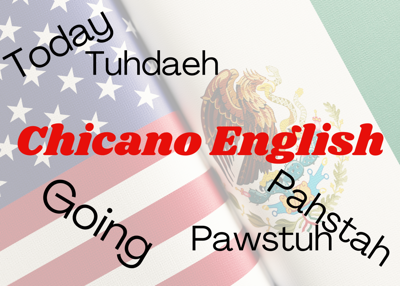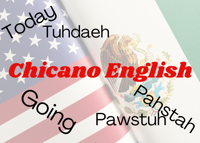According to linguistics, everyone has an accent. During college I took a couple of linguistics classes and the most interesting aspect that I learned was that everyone, regardless of where they come from, has an accent. It may be the “standard accent” that television anchors possess, but it is still an accent, and your accent says a lot about your own culture.
Independent journalist Fernando Hurtado released a video on YouTube about Chicano English, in which he explores the intricacies of Chicano English. Although it is mostly spoken by Mexican Americans, many people who grew up around Mexican American culture, like in Los Angeles, also speak Chicano English or at least say some words in Chicano English.
Hurtado said he learned about Chicano English when doing a story on Miami English, which has its own intonations and peculiarities.
It’s important to note that Chicano English is different from Spanglish. Monolingual speakers can speak Chicano English. Spanglish requires knowledge of both Spanish and English.
Chicano English “is a variety of English that is associated with people generally of Mexican American ethnicity and generally in the Southwest, although it can be found in other places,” said Carmen Fought in the video. She is a professor of linguistics at Pitzer College and author of the book “Chicano English in Context.”
So what makes Chicano English different from standard English? The intonation and pronunciation of words like pasta (pawstuh) becomes “pahstah” and saw becomes “sah”. They become Spanish-sounding words, without actually being Spanish.
Vowels are emphasized at the start of words, like below and today.
I’m not sure if I personally speak Chicano English because I am not a native speaker and I grew up in Mexico City. But I have lived here most of my adult life so I think I may pronounce some words in Chicano English.
My daughter says I emphasize the word “latte” and I also say job as “yob” sometimes. So it may be a combination of English as a second language and Chicano English.
According to Hurtado, LAUSD published a document titled “Teachers Guide to Supporting Mexican American Standard English Learners,” meant to “serve as a reference manual of the linguistic features of Mexican American Language (MxAL), also referenced as Chicano English.”
Fought and Hurtado emphasized that it’s important to remember that Chicano English is not “bad” or “less” than the “standard” English. “The people in power speak this way,” Fought said when talking about the way that she and Hurtado speak. “If all people in power were Latinx folk who spoke Chicano English, then that would be the standard.”











(0) comments
Welcome to the discussion.
Log In
Keep it Clean. Please avoid obscene, vulgar, lewd, racist or sexually-oriented language.
PLEASE TURN OFF YOUR CAPS LOCK.
Don't Threaten. Threats of harming another person will not be tolerated.
Be Truthful. Don't knowingly lie about anyone or anything.
Be Nice. No racism, sexism or any sort of -ism that is degrading to another person.
Be Proactive. Use the 'Report' link on each comment to let us know of abusive posts.
Share with Us. We'd love to hear eyewitness accounts, the history behind an article.